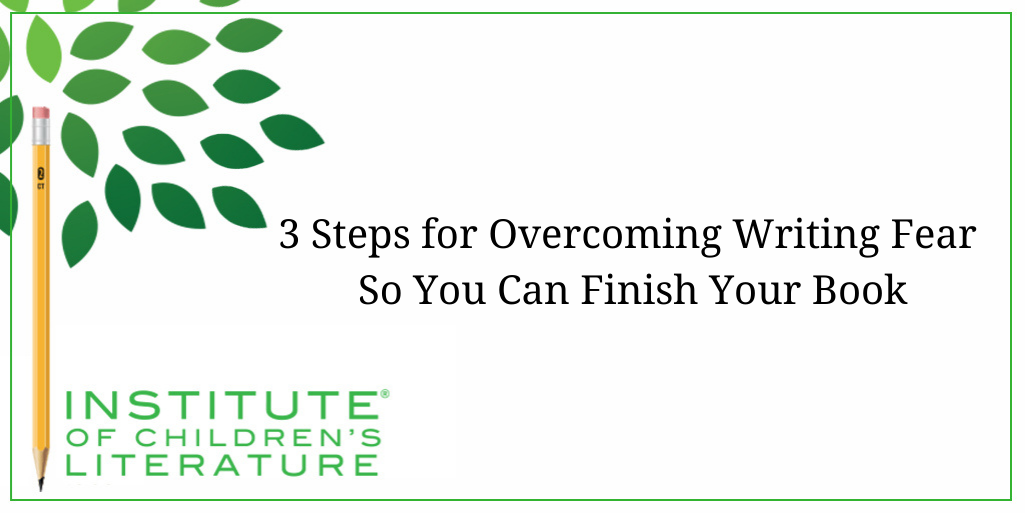
5 Ways Writers Can Prep for 2025 Goal Setting
Before we roll on to the new writing year, let’s harness our optimism for the blank slate before us and prepare for our 2025 Goal Setting just for writers.

Some things simply don’t mix well. One of these bad combinations is creativity and fear. Fear of failure. Fear of success. Fear of giving naysayers more reason to say nay. Fear that something you want so badly simply isn’t for you. Writers are often living in the midst of a maelstrom of fears, and the biggest problem with that (beyond how uncomfortable it is) is the fact that fear suppresses creativity. Fear is so big and attention-getting that it’s hard to be creative around it. Too often, fear keeps us from finishing the books we begin.
Fear often creeps in when you least expect it. Most writers, when in the grip of an exciting new idea, barely notice the fears that lurk in the back of their minds. They’re so in love with this new thing, this new idea, this new hope for success and the energy of that excitement drives back fear. Unfortunately, writing is a lot more than coming up with great, exciting ideas. Writing happens when you begin to do the work, and that’s usually when the fears begin to creep in. These fears are perfectly happy to pile on top of one another until the writing grinds to a halt, dragged down by the writer’s block that fear produces. And too often, writers give up on the book long before finishing when it wasn’t the book that was the problem; it was the fear. Let’s consider three steps for overcoming your writing fear—whatever it may be.
Though virtually every writer battles fear, we don’t all battle the same ones. Some writers are afraid of the changes in their lives that will come once the book is done and published. If you’re a memoir writer, you may worry about the relationship fallout that might come from having written the book. If you’re a naturally shy person, you may worry that a published book, especially a successfully published book, will force you to interact with people beyond your comfort zone.

Knowing which fears plague you can help you know how to respond to them. Fear usually grows out of a mix of truth and lies. For example, a fear that a published book will change your life in scary ways may grow out of having heard that published writers have to “put themselves out there” or else the book cannot succeed. And certainly, writers need to make efforts to help increase their name recognition, but there are so many ways to do that, and the way that works for you may not involve interacting with people face to face at all.
Once you’ve named the fear, pick it apart to discover the lies buried in it so that you can inject truth into the situation. Then tell yourself the truth. “I will have to do some promotion, but I don’t have to go beyond what I’m comfortable with. There are writers who never sign books at all, and still have successful careers.” Then look for ways to strengthen the truth—maybe by learning more about writing and promotion or making a plan. Actively fighting the fear with truth can often help you battle the fear-based writer’s block until it’s completely gone.
Writers tend to need to talk about their struggles. After all, a need to communicate is often what turned us into writers in the first place. But we’re not always good at deciding when and where to share. And far too often we share with people we feel should be supportive but aren’t. One of the best things you can do is stop expecting that some people should be supportive. If they’ve shown themselves to be naysayers, stop trying to get them to be cheerleaders. Instead, cut them out of the “talk about writing” loop. They don’t get it.
Find someone who does get it.
These days with so many writers online as well as forming writing communities online in places like Facebook, Twitter, Instagram, or Tumblr, there truly is a supportive place for every writer somewhere.
Don’t try to be active everywhere. You don’t need to be in all those places. You need the one that works for you. So, check out multiple social media networks and find the one that feels right to you. Jump into existing conversations and chip in a tip or a word of encouragement. Then when you have the feel of a community, bring up the things you struggle with. More times than not, you’ll learn you aren’t the only one facing that problem. And the feedback you’ll get is often far more helpful and uplifting than the responses you’ve gotten when talking to non-writers who simply don’t really get it. And if you find a specific community doesn’t work for you, don’t worry about it. There are plenty more.
Consider taking a writing course. When your fear creeps in, you’ll have the objectivity of a one-on-one instructor giving you critiques and also offering you a way to improve your skills. You don’t have to feel stuck in the fear. An instructor will offer you a way to overcome your writing fear that you may not see on your own.
When you’re stuck in a fear-based writing block that keeps you from finishing the book, the key is to not stop writing. Stopping completely creates a gap between you and your creative flow that tends to widen rather than narrow. You might think that’s easy to say. If you could just keep going on the book, you wouldn’t have the problem in the first place. I get that. But if you need to take a pause on a specific book until you overcome the fear, don’t let it mean you pause on writing completely.
Instead, try changing directions and using your writing to battle the problem. Write about your fear. Give it a name, something silly, and create a funny conversation between you and your fear. My writing fear tends to be named Edith and she’s very shrill, which I point out in these conversations as I imagine them. Her side will always be her shrieking fearful things at me while I notice that she talks through her nose or that she seems to be losing her hair or that she has halitosis. I’m mean to my writing fear, I’ll admit it. But as I treat the fear as less than intimidating, I find the fear less scary. On top of that, the very exercise of writing, even when it’s something as silly as a conversation with my fears, gets me out of the bog of writer’s block and back into the flow, almost without me noticing.
Fear can be exhausting and hard, but it can also be overcome. I admire those folks who confront fears directly and simply overpower them, but I’m not one of those people. I tend to have to do an end-run around mine by recognizing when fear is slowing me down, leaning on the support of people I trust, and trimming the fears down to size, one sarcastic, creative bite at a time. It works for me, and I have the published books to prove it. So, give it a try. Pull out those fears and laugh in their faces. You may be surprised to discover they shrink faster than you would have ever guessed.
With over 100 books in publication, Jan Fields writes both chapter books for children and mystery novels for adults. She’s also known for a variety of experiences teaching writing, from one session SCBWI events to lengthier Highlights Foundation workshops to these blog posts for the Institute of Children’s Literature. As a former ICL instructor, Jan enjoys equipping writers for success in whatever way she can.

Before we roll on to the new writing year, let’s harness our optimism for the blank slate before us and prepare for our 2025 Goal Setting just for writers.

Writers can be thin-skinned when it comes to getting feedback on their work. Let’s look at 4 ways to positively deal with constructive criticism!

Rejection is part of the territory when it comes to being a writer. Today we offer reflection for writers to help redirect your efforts after a rejection.
1000 N. West Street #1200, Wilmington, DE 19801
© 2024 Direct Learning Systems, Inc. All rights reserved.
1000 N. West Street #1200, Wilmington, DE 19801
© 2024 Direct Learning Systems, Inc. All rights reserved.
1000 N. West Street #1200, Wilmington, DE 19801
© 2024 Direct Learning Systems, Inc. All rights reserved.
1000 N. West Street #1200, Wilmington, DE 19801
© 2025 Direct Learning Systems, Inc. All rights reserved.
1000 N. West Street #1200, Wilmington, DE 19801
©2025 Direct Learning Systems, Inc. All rights reserved. Privacy Policy.
4 Comments